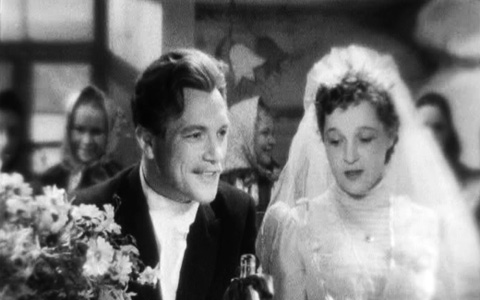
It seems that screenwriters, perhaps prodded by their own life experiences, have long found the teacher in the classroom to be a compelling stage to tell a story. American audiences are familiar with titles as diverse as Blackboard Jungle (1955) and Mr. Holland’s Opus (1995). There is one production that predates all of these, however, and it is the 1947 film, “The Village Teacher,” a product of the Union of Soviet Socialist Republics.
The film is directed by Mark Donskoy, a protégé of Sergei Eisenstein, which becomes quite apparent when the viewer is caught off guard by unique camera angles and creative photography. Also very impressive throughout the production is the remarkable ability of the actors to appear at different stages in their life, realistically and with flawless make-up. One almost gets the feeling they are watching a documentary that took decades to make.
As the film opens we are placed at an elegant ball in imperial St. Petersburg where Vera, an exuberant youth excitedly tells her dance partner, a dashing young cadet named Sergei, that she will soon fulfill her dream of becoming a teacher. Her life’s goal will not be carried out in the comfort of the city; however, she will be traveling miles away to a remote Siberian village. We soon learn there is more to Sergei than meets the eye when the Tsar’s police suspect him of revolutionary activity and arrest him that very evening.
Vera’s teaching career gets off to an inauspicious beginning as the locals mock her city naïveté, demonstrated by her failure to bring along a proper pair of felt boots to guard against the notoriously harsh winters. These attitudes towards the newcomer change however when they witness her courageously interrupting an episode of domestic violence involving a village bully of whom even the rough and tumble male residents are afraid.
Gradually the locals see the value of the teacher’s contributions to their children who in turn begin instructing their younger chums on their own, even fashioning a globe out of twigs and holding impromptu lessons in the fields.
Fundamental problems of life in capitalist Russia remain, however, and Vera is soon confronted with the cruel realities of class antagonisms. Her most gifted pupil is denied entry to high school because the examiners will not hear of a peasant boy sitting elbow to elbow with the sons of privilege.
In addition to Vera and Sergei, there are also many minor characters that help round out the scenery and are also quite memorable. This includes the school custodian, loyal and sympathetic to Vera in her noble pursuits. She is very strict in her rule that he not interrupts a class when it is in session, and so is quite surprised one morning when he bursts into the room ringing a bell. She sternly reminds him that the bell should only be rung at break times and to this he replies, “It’s a break for everybody! The tsar has been thrown down! A break!”
The film is not only outstanding family entertainment, it is also a pretty good capsule course in modern Russian history. In a touching scene, Sergei, fresh from exile and brimming with news of the tsar’s downfall, explains to Vera the nature of the struggle ahead to transform society. Vera replies that for her there is only her teaching and all she wants to know is if this new epoch, upon which they are about to enter, will finally allow her gifted student to be admitted to a school of higher learning. Sergei assures her that from now on her students will be free to pursue any path in life they choose.
After the civil war however, Vera’s worldview and understanding of socialism matures. She proves her bravery and conviction when a small gang of counter-revolutionary locals plots to oppose collectivization by murdering her and putting the school to the torch. She informs the reactionaries that it is too late, and if they wish to reverse the course of history that they will have to kill not only her, but all the children she has already taught.
When a class reunion is interrupted by the news of the Nazi invasion, Vera assists in the mobilization for defense, illustrated in a heart-wrenching scene so stirring that even the most cynical viewer would find a lump in their throat.
At a time when in our own country public school teachers are demonized by right-wing proselytizers and budget cutting politicians scheming to increase tax breaks for the ultra rich, it would do well for American audiences to sit down and watch an illustration of how a teacher can help provide the next generation with the tools to construct a brighter and more just future.
“The Village Teacher”
Directed by Mark Donskoy
1947, 100 min.
Photo: Actress Vera Petrovna Maretskaya plays Vera in “The Village Teacher.” (CC)

MOST POPULAR TODAY

Zionist organizations leading campaign to stop ceasefire resolutions in D.C. area


High Court essentially bans demonstrations, freedom of assembly in Deep South

Communist Karol Cariola elected president of Chile’s legislature

Afghanistan’s socialist years: The promising future killed off by U.S. imperialism






Comments